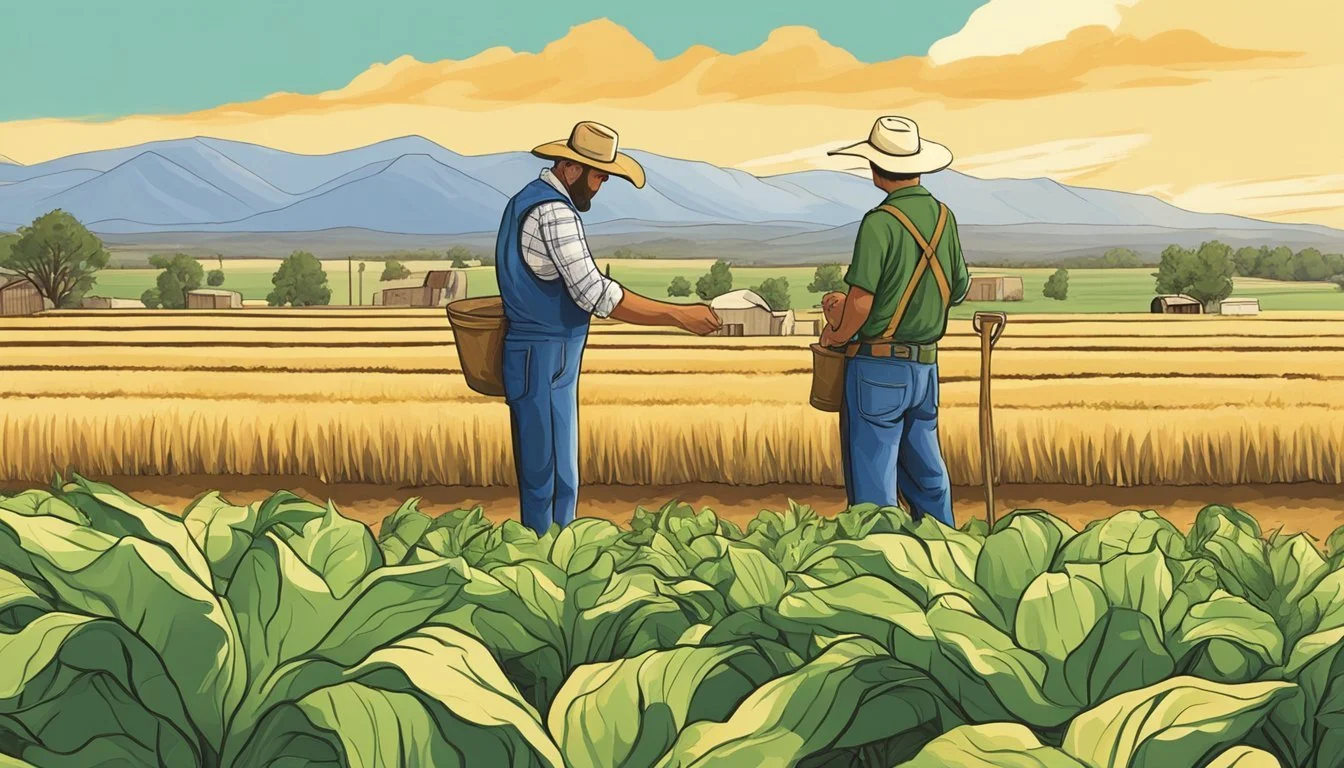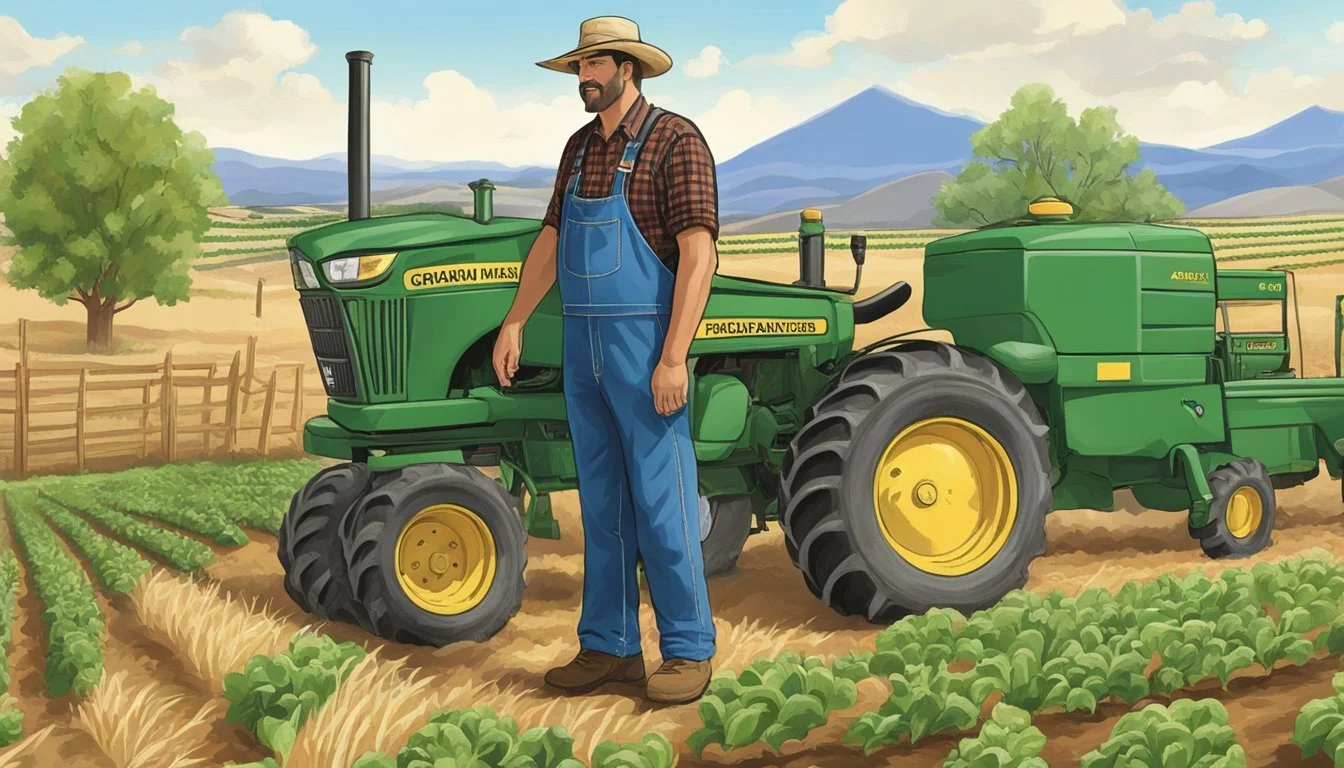Farming Grants New Mexico
Navigating Opportunities for Local Agriculturists
In New Mexico, the agricultural sector is given a significant boost through various farming grants designed to support and sustain the industry. These grants are aimed at enhancing production, encouraging innovation, and bolstering the economic viability of farms and ranches within the state. Programs such as the Value Added Producer Grants provide financial assistance to producers, enabling them to develop products that add value beyond the raw commodity, which often translates into increased revenue for farmers and ranchers. The strategic use of these grants helps maintain New Mexico's rich tradition of farming by providing the necessary capital for growth and expansion.
Farmers and ranchers in New Mexico also benefit from specialized financial programs like the Beginning Farmer Down Payment Loan, which facilitates the acquisition of farm real estate by new entrants into the industry. Additionally, initiatives such as the Discrimination Financial Assistance Program acknowledge past disparities and offer financial support to those who have faced discrimination within USDA farm lending programs. This array of targeted grants and programs demonstrates a commitment to creating an equitable and prosperous farming environment in New Mexico. Through these measures, the state works to ensure that its agricultural community is robust, diverse, and competitive in the domestic and global markets.
Understanding Farming Grants
Farming grants in New Mexico provide vital financial support to the agricultural sector, focusing on innovation, conservation, and the promotion of farming practices. These grants target a spectrum of needs from infrastructure development to economic sustainability in rural areas.
Types of Grants Available
New Mexico offers various grants through entities like the USDA's Farm Service Agency (FSA) and the Natural Resources Conservation Service (NRCS). Available programs cater to different aspects of agricultural development:
Direct Farm Ownership Loans: Support beginning and socially disadvantaged farmers with a limit of $300,000.
Conservation Innovation Grants (CIG): Fund up to $50,000 for projects that promote conservation practices.
Value Added Producer Grants: Assist producers in creating added value for their agricultural products.
Rural Community Development Initiative Grants: Offer aid for housing, community facilities, and economic projects in rural areas.
Eligibility Criteria
Eligibility for farming grants varies:
Individuals and Groups: Including independent producers, agricultural producer groups, and cooperatives.
Beginning Farmer Designation: New and entry-level farmers get prioritized for some programs.
Socially Disadvantaged Applicants: As mandated by specific legislation, percentages of certain funding are reserved.
Non-Profit and Public Bodies: Some grants target non-profit organizations and public bodies for rural community initiatives.
Grant Purposes and Outcomes
The intent behind the provision of farming grants centers on specific outcomes:
Conservation Efforts: Promote sustainable land use and improve environmental health.
Economic Growth: Enable farmers to expand their markets and create jobs in rural communities.
Innovation in Agriculture: Encourage the adoption of innovative practices and technologies in farming.
Community Support: Foster the development of essential community facilities for the betterment of rural livelihoods.
Each grant has program instructions and application forms that provide guidance on how to seek funding and what constitutes a match for the grant award. Some grants may also require matching funds and offer technical assistance to ensure successful grant implementation.
How to Apply for Farming Grants
Applying for farming grants in New Mexico involves navigating a specific process, adhering to deadlines, and preparing the necessary documentation. Entities such as the USDA and NMDA provide guidance and resources to aid applicants.
Application Process
Applicants must carefully follow the program instructions provided by entities like the USDA's Rural Development and the Natural Resources Conservation Service (NRCS). Initially, potential grantees need to identify funding opportunities relevant to their needs. They can find such opportunities on Grants.gov, which is the central platform for electronic applications. It is crucial to adhere to submission deadlines; for instance, electronic submissions typically have a cut-off time denoted in Eastern Time, while paper applications must arrive by local time at the appropriate state office.
Required Documentation
The application requires several forms of documentation, which may include:
Business plans to demonstrate the feasibility and sustainability of the proposed project
Proof of eligibility such as status as an independent producer, agricultural producer group, or farmer cooperative
Financial records that establish the applicant's need for financing
The USDA's Farm Service Agency and other agencies provide Program Instructions and checklists to ensure complete and accurate submission of all required paperwork.
Finding Grant Opportunities
Prospective applicants should monitor the New Mexico Department of Agriculture (NMDA) and USDA websites regularly for announcements of grant opportunities. Citations of specific programs, such as the Rural Community Development Initiative Grants or the Value Added Producer Grants, often include details about the purpose of the grant, eligibility criteria, and amount of funding available. These announcements and the associated Fact Sheets are essential for understanding the scope and requirements of each grant.
State-Specific Programs in New Mexico
New Mexico offers a variety of state-specific programs aimed at enhancing farming practices and supporting the growth of the agricultural sector. These initiatives provide technical assistance and encourage sustainable practices across the state's diverse rural landscapes.
New Mexico Department of Agriculture Initiatives
The New Mexico Department of Agriculture (NMDA) actively supports farmers through multiple grant opportunities and technical assistance programs. One such initiative includes the provision of grants for farmers to engage in value-added activities, thus opening up new marketing avenues and boosting income. These are often targeted towards beginning farmers and ranchers, emphasizing the growth and sustainability of the state's agricultural future.
Healthy Soil Program
Under the NMDA, the Healthy Soil Program is dedicated to improving soil vitality and encouraging environmentally friendly farming practices. Technical assistance provided under this program helps farmers to both understand and adopt practices that contribute to soil health, leading to more sustainable agriculture and better crop yields. This program stands as a testament to New Mexico's commitment to environmentally sustaining farming practices.
Water Conservation Programs
Water scarcity has long been a concern in New Mexico, prompting the state to institute several water conservation programs tailored for the agricultural sector. These programs aim to assist farmers in implementing water-efficient practices, ranging from drip irrigation techniques to rainwater harvesting. By reducing water use and wastage, these programs support the long-term viability of farming in the state's arid and semi-arid regions.
Federal Programs and Resources
Federal programs provide a wide array of resources to New Mexico farmers including grants, loans, and technical assistance aimed at improving farm operations, conservation efforts, and rural community enhancement.
USDA Farm Service Agency Programs
The U.S. Department of Agriculture (USDA) Farm Service Agency (FSA) offers numerous programs to assist farmers. Financial assistance is available through Farm Loans which cater to Farm Ownership and Operating Loans. These loans support farmers in purchasing land, equipment, and supplies. Additionally, the FSA provides Crop Insurance to protect against the loss of their crops due to natural disasters.
Farm Ownership Loans
Operating Loans
Crop Insurance
Natural Resources Conservation Service (NRCS)
The Natural Resources Conservation Service (NRCS), part of the USDA, advances conservation efforts. They administer the Environmental Quality Incentives Program (EQIP) that supports farmers with cost-sharing and technical assistance for conservation practices. The focus is to enhance environmental quality and preserve natural resources within rural America.
Environmental Quality Incentives Program (EQIP)
Technical Assistance
Conservation Practices
Rural Development Programs
Rural Development, an agency within the USDA, emphasizes economic development and improving the quality of life in rural areas. Programs include:
Value Added Producer Grants (VAPG)
Planning Grants up to $75,000
Working Capital Grants up to $250,000
Cost share match requirement of 100% of the grant amount
Rural Community Development Initiative (RCDI) Grants
Support for housing, community facilities, and economic development projects.
Available to non-profit organizations, low-income rural communities, and federally recognized tribes.
Housing Assistance Programs
Opportunities for homeownership for low- and moderate-income rural Americans.
Funding for home improvements ensuring safe and sanitary living conditions.
These resources are tailored to meet the diverse needs of New Mexico's agricultural sectors, ranging from small family farms to larger agribusiness operations.
Financial Planning for Farmers and Ranchers
Proper financial planning is essential for farmers and ranchers in New Mexico, incorporating aspects such as business plan development, navigating farm loans, and managing insurance and risk. These components build a foundation for successful agricultural ventures.
Developing a Business Plan
When farmers and ranchers in New Mexico set out to develop a business plan, they outline goals, strategies, and financial forecasts. Feasibility studies are often the first step, helping to determine the viability of their agricultural projects. A comprehensive business plan should include:
Market Analysis: Understanding the demand for products.
Financial Planning: Budgets, projected cash flows, and cost analyses.
Beginning farmers may also use their business plans to secure funds, including grants up to $75,000 for planning and up to $250,000 for working capital under Value Added Producer Grants.
Understanding Farm Loans
Farm loans are an integral part of financial planning for New Mexico farmers and ranchers. The USDA Farm Service Agency (FSA) offers loans up to $300,000. Here are key considerations:
Loan Purpose: Direct loans cater to purchasing land, livestock, equipment, and other needs.
Eligibility: Targeted funds exist for beginning farmers and socially disadvantaged individuals.
Borrowers must understand the terms and conditions, ensuring they align with their business plans.
Insurance and Risk Management
Insurance and risk management are crucial in protecting New Mexico farmers and ranchers against unforeseen events. Crop insurance is a common risk management tool that safeguards against natural disasters and market fluctuations. Key points include:
Policy Selection: Choosing the right level of coverage for different crops.
Cost Management: Balancing premiums with potential risks.
Farmers should review programs like the Discrimination Financial Assistance Program, which compensates those who faced discrimination in historical USDA lending programs.
Support for Specialized Farming
In response to the evolving needs of New Mexico's agricultural landscape, several grants have been established to support specialized farming practices, focusing on organic farming, regenerative agriculture, and assisting beginning and young farmers. These efforts emphasize innovation and conservation, providing both financial aid and technical assistance.
Organic Farming
Organic producers in New Mexico can benefit from grants aimed at enhancing organic crop production. This financial support fosters the adoption of sustainable practices and helps farmers transition to organic certification. Additionally, funds may be used for market expansion, ensuring that organic farmers have a broader reach for their products.
Regenerative Agriculture Practices
Grants targeting regenerative agriculture practices aim to revitalize the land and ensure the long-term health of farming ecosystems. Funding is directed towards projects that enhance soil conservation, water retention, and biodiversity. Farmers are encouraged to implement innovative techniques that contribute to the sustainability and resilience of their operations.
Support for Beginning and Young Farmers
The state extends a nurturing hand to beginning and young farmers, directing a portion of funds to those who are new to the industry. This includes support for both farming and ranching, with a strong emphasis on providing technical assistance. The objective is to bolster the next generation of agriculturalists, ensuring that they have the necessary tools and knowledge to succeed in their endeavors.
Community and Economic Development
New Mexico places considerable emphasis on initiatives and programs that foster community and economic development, with specific attention to the needs of rural areas. These efforts often focus on strengthening infrastructure, promoting business development, and forming strategic partnerships, all aimed at enhancing the overall prosperity of cities, towns, and rural communities.
Rural Community Development Initiatives
Rural Community Development Initiative (RCDI) grants offer crucial support to non-profit housing and community development organizations. These grants assist low-income rural communities and federally recognized tribes in their endeavors to improve housing, community facilities, and community and economic development projects. The primary objective is to facilitate services that are essential for the structured development and growth of these rural areas, aiming to bolster the quality of life for their populations.
Eligibility for RCDI Grants:
Public bodies
Non-profit organizations
Federally recognized tribes
Agricultural Economic Development Programs
In the realm of agriculture, New Mexico extends substantial program resources to fortify economic development in the sector. The Rural Business Development Grants (RBDG) encourage growth, stressing equitable access as underscored in the Federal Register publication. The New Farmer Network, for instance, aggregates a list of loans tailored for new and beginning farmers. These loans include access to land, infrastructural enhancements, and cover for startup costs.
Types of Agricultural Loans:
Farm Operating Loans
Small/Beginning Farmer Microloan Program
Partnership and Collaboration Opportunities
New Mexico recognizes that partnerships are pivotal in propelling community and economic development. Collaboration across federal, state, and local governments, along with private and nonprofit sectors, creates a synergistic approach to tackling complex challenges in rural development. These opportunities afford various stakeholders the chance to partake in grant programs, like the Economic Impact Initiative Grants, that prioritize establishing essential community facilities and fortifying the economic resilience of rural areas.
Key Partnerships Include:
Public bodies
Non-profits
Federally recognized Tribes
Local community members
Preparation and Training
In New Mexico, farmers can optimize their grant application process by engaging in various preparation and training initiatives. These initiatives are designed to provide the necessary guidance, enhance technical skills, and offer comprehensive support.
Workshops and Webinars
The New Mexico Department of Agriculture organizes informative workshops and webinars for farmers. Interested participants should email to include their preferred date and time. These sessions occur before important deadlines, such as the Specialty Crop Block Grant Program, and aim to equip farmers with in-depth program resources and application guidance.
On-Site Training Opportunities
On-site training opportunities are available, offering hands-on experience and direct technical assistance. These training sessions are essential for farmers looking to extend their expertise in specialty crops and innovative farming practices that may bolster their grant proposals.
Online Resources and Support
Farmers have access to various online resources and support mechanisms. The Federal Register updates can be supplemented with additional online documents that give clear instructions on grant program requirements. Electronic submission guidance ensures that applicants submit their grants through proper channels like Grants.gov by the designated deadlines.
Navigating Grant Regulations and Compliance
In New Mexico, farmers and agricultural businesses seeking grant assistance must adhere to specific regulations and ensure ongoing compliance to maintain funding. This section provides key insights into understanding these requirements and managing the associated oversight processes effectively.
Understanding Regulations and Requirements
Grant programs such as the Value Added Producer Grants and the Rural Cooperative Development Grant Program have defined eligibility criteria and usage stipulations for the funds provided. For instance, value-added grants may support independent producers and producer groups, while rural development grants focus on non-profit organizations enhancing rural communities.
Citations and Program Instructions: Grant recipients are usually obliged to follow program instructions, which include detailed requirements that need to be met for both application and the use of funds. These guidelines are often provided in the form of federal register notices or fact sheets, which include important citations of laws and regulations.
Compliance and Monitoring
Grant compliance involves regular monitoring and reporting on how funds are utilized, ensuring they align with the goals of programs like the Environmental Quality Incentives Program (EQIP), which emphasizes sustainable production and environmental protection.
Regulation and Guidance: Ongoing guidance from regulatory bodies is crucial for recipients to stay compliant. This may involve periodic reviews, site visits, or audits. Farmers can often seek assistance from state-specific resources or consult with program officials to understand their obligations and avoid non-compliance penalties.
Becoming a Grant Recipient
In New Mexico, agricultural producers and rural businesses have the opportunity to bolster their operations through various grant programs. Successful applicants must navigate the post-award process, which includes stringent reporting and accountability requirements.
After the Grant Award
Once recipients are granted funds, they must carefully adhere to the terms and conditions that come with the award. This adherence ensures the proper utilization of funds and aligns with the grant's intended purpose. For example, grantees of the Value Added Producer Grants must use the funds explicitly for activities such as developing new products or expanding their marketing opportunities.
Grant recipients usually receive specific guidelines detailing how and when the funds can be used. It is crucial that recipients fully understand these guidelines to avoid any misuse of funds, which could result in penalties or even the forfeiture of the grant.
Reporting and Accountability
Recipients are required to provide regular reports that often include both financial and narrative components. These reports give granting agencies a clear picture of how the funds are being used and the progress being made.
Reporting usually involves the following:
Financial Statements: Documentation showing how grant funds have been spent.
Progress Reports: Updates on the project's status and any outcomes or benefits realized so far.
Failure to comply with reporting requirements can lead to revocation of the grant, repayment of funds, or ineligibility for future funding. Agencies enforce these accountability measures to ensure funds benefit the agricultural sector and rural communities as intended.








